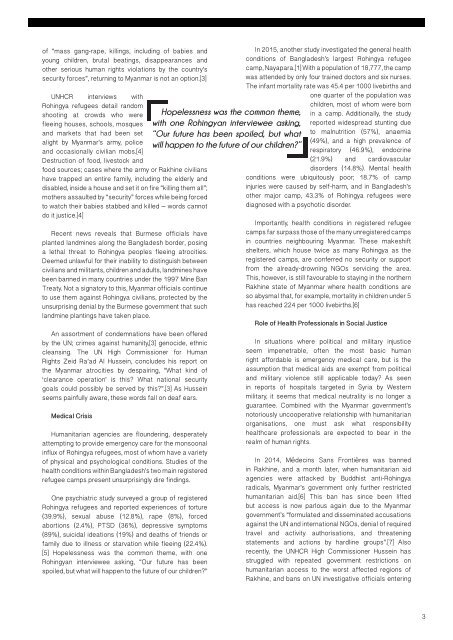Vector Volume 11 Issue 2 - 2017
Create successful ePaper yourself
Turn your PDF publications into a flip-book with our unique Google optimized e-Paper software.
of “mass gang-rape, killings, including of babies and<br />
young children, brutal beatings, disappearances and<br />
other serious human rights violations by the country’s<br />
security forces”, returning to Myanmar is not an option.[3]<br />
UNHCR interviews with<br />
Rohingya refugees detail random<br />
shooting at crowds who were<br />
fleeing houses, schools, mosques<br />
and markets that had been set<br />
alight by Myanmar’s army, police<br />
and occasionally civilian mobs.[4]<br />
Destruction of food, livestock and<br />
food sources; cases where the army or Rakhine civilians<br />
have trapped an entire family, including the elderly and<br />
disabled, inside a house and set it on fire “killing them all”;<br />
mothers assaulted by “security” forces while being forced<br />
to watch their babies stabbed and killed – words cannot<br />
do it justice.[4]<br />
Recent news reveals that Burmese officials have<br />
planted landmines along the Bangladesh border, posing<br />
a lethal threat to Rohingya peoples fleeing atrocities.<br />
Deemed unlawful for their inability to distinguish between<br />
civilians and militants, children and adults, landmines have<br />
been banned in many countries under the 1997 Mine Ban<br />
Treaty. Not a signatory to this, Myanmar officials continue<br />
to use them against Rohingya civilians, protected by the<br />
unsurprising denial by the Burmese government that such<br />
landmine plantings have taken place.<br />
An assortment of condemnations have been offered<br />
by the UN; crimes against humanity,[3] genocide, ethnic<br />
cleansing. The UN High Commissioner for Human<br />
Rights Zeid Ra’ad Al Hussein, concludes his report on<br />
the Myanmar atrocities by despairing, “What kind of<br />
‘clearance operation’ is this? What national security<br />
goals could possibly be served by this?”.[3] As Hussein<br />
seems painfully aware, these words fall on deaf ears.<br />
Medical Crisis<br />
Humanitarian agencies are floundering, desperately<br />
attempting to provide emergency care for the monsoonal<br />
influx of Rohingya refugees, most of whom have a variety<br />
of physical and psychological conditions. Studies of the<br />
health conditions within Bangladesh’s two main registered<br />
refugee camps present unsurprisingly dire findings.<br />
One psychiatric study surveyed a group of registered<br />
Rohingya refugees and reported experiences of torture<br />
(39.9%), sexual abuse (12.8%), rape (8%), forced<br />
abortions (2.4%), PTSD (36%), depressive symptoms<br />
(89%), suicidal ideations (19%) and deaths of friends or<br />
family due to illness or starvation while fleeing (22.4%).<br />
[5] Hopelessness was the common theme, with one<br />
Rohingyan interviewee asking, “Our future has been<br />
spoiled, but what will happen to the future of our children?”<br />
Hopelessness was the common theme,<br />
with one Rohingyan interviewee asking,<br />
“Our future has been spoiled, but what<br />
will happen to the future of our children?”<br />
In 2015, another study investigated the general health<br />
conditions of Bangladesh’s largest Rohingya refugee<br />
camp, Nayapara.[1] With a population of 18,777, the camp<br />
was attended by only four trained doctors and six nurses.<br />
The infant mortality rate was 45.4 per 1000 livebirths and<br />
one quarter of the population was<br />
children, most of whom were born<br />
in a camp. Additionally, the study<br />
reported widespread stunting due<br />
to malnutrition (57%), anaemia<br />
(49%), and a high prevalence of<br />
respiratory (46.9%), endocrine<br />
(21.9%) and cardiovascular<br />
disorders (14.8%). Mental health<br />
conditions were ubiquitously poor; 18.7% of camp<br />
injuries were caused by self-harm, and in Bangladesh’s<br />
other major camp, 43.3% of Rohingya refugees were<br />
diagnosed with a psychotic disorder.<br />
Importantly, health conditions in registered refugee<br />
camps far surpass those of the many unregistered camps<br />
in countries neighbouring Myanmar. These makeshift<br />
shelters, which house twice as many Rohingya as the<br />
registered camps, are conferred no security or support<br />
from the already-drowning NGOs servicing the area.<br />
This, however, is still favourable to staying in the northern<br />
Rakhine state of Myanmar where health conditions are<br />
so abysmal that, for example, mortality in children under 5<br />
has reached 224 per 1000 livebirths.[6]<br />
Role of Health Professionals in Social Justice<br />
In situations where political and military injustice<br />
seem impenetrable, often the most basic human<br />
right affordable is emergency medical care, but is the<br />
assumption that medical aids are exempt from political<br />
and military violence still applicable today? As seen<br />
in reports of hospitals targeted in Syria by Western<br />
military, it seems that medical neutrality is no longer a<br />
guarantee. Combined with the Myanmar government’s<br />
notoriously uncooperative relationship with humanitarian<br />
organisations, one must ask what responsibility<br />
healthcare professionals are expected to bear in the<br />
realm of human rights.<br />
In 2014, Médecins Sans Frontières was banned<br />
in Rakhine, and a month later, when humanitarian aid<br />
agencies were attacked by Buddhist anti-Rohingya<br />
radicals, Myanmar’s government only further restricted<br />
humanitarian aid.[6] This ban has since been lifted<br />
but access is now parlous again due to the Myanmar<br />
government’s “formulated and disseminated accusations<br />
against the UN and international NGOs, denial of required<br />
travel and activity authorisations, and threatening<br />
statements and actions by hardline groups”.[7] Also<br />
recently, the UNHCR High Commissioner Hussein has<br />
struggled with repeated government restrictions on<br />
humanitarian access to the worst affected regions of<br />
Rakhine, and bans on UN investigative officials entering<br />
3

















